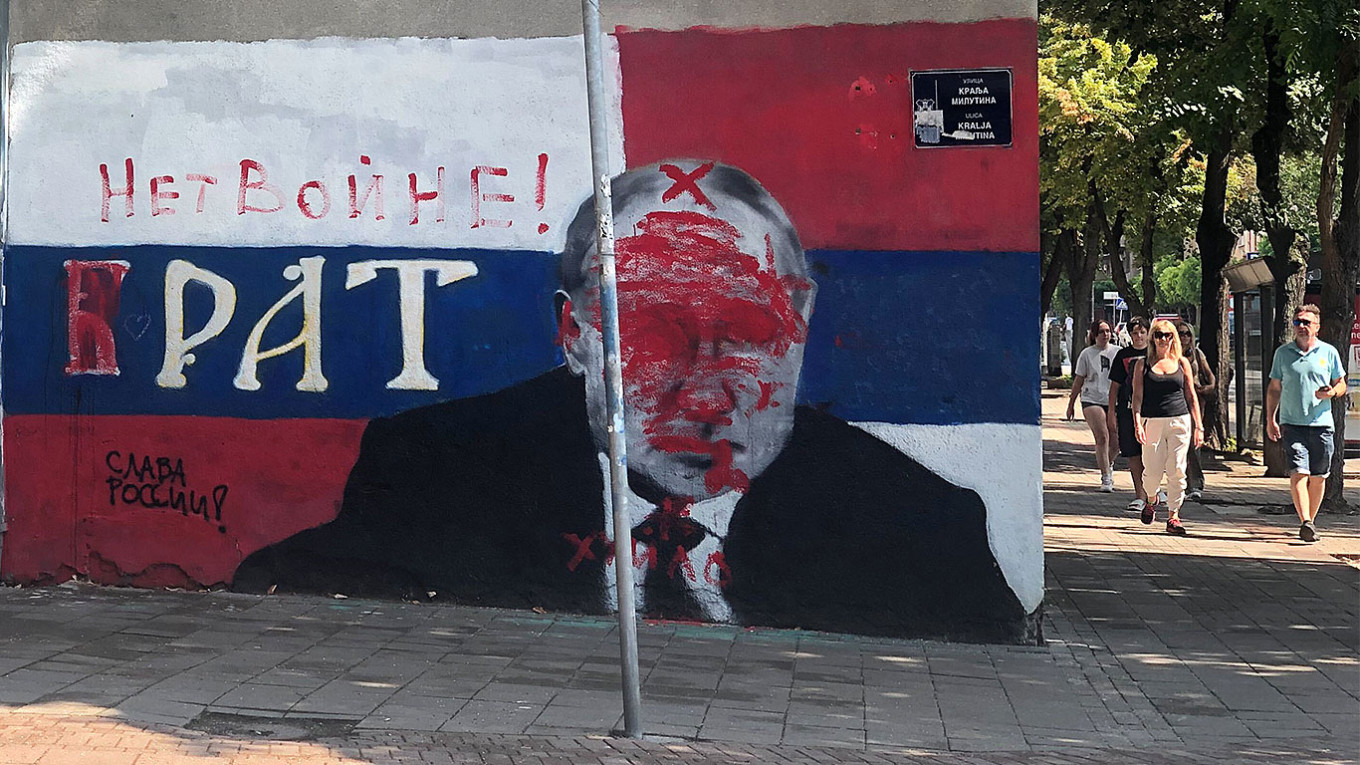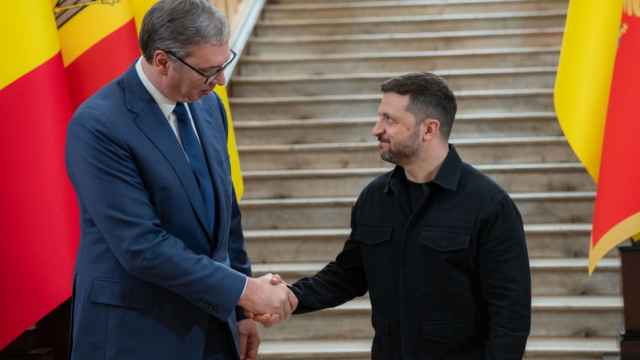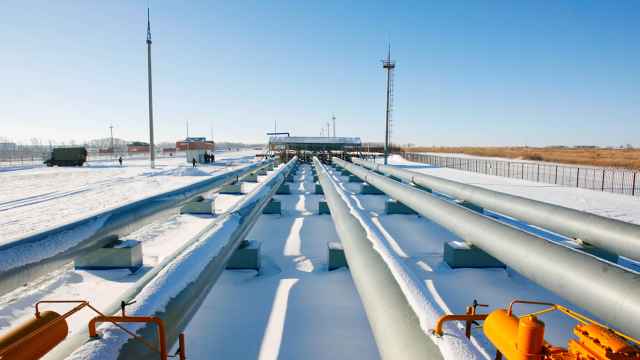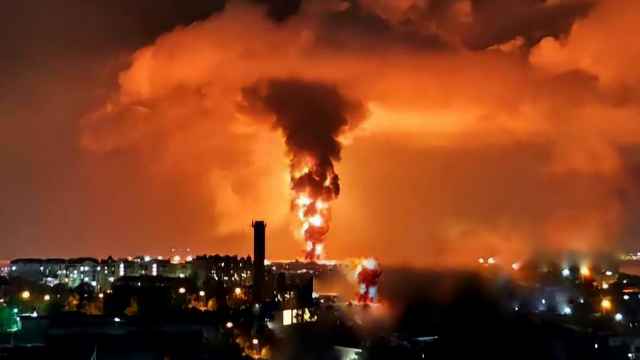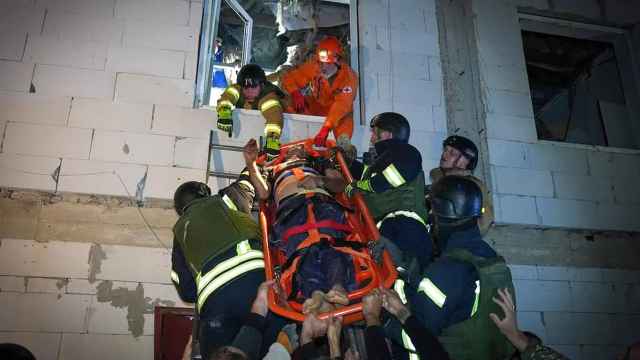BELGRADE, Serbia — The lavishly decorated main entrance of Serbia’s baroque-style parliament building was barely visible behind a sea of protest tents and a makeshift stage adorned with billboards.
One of the billboards featured the face of Russian Foreign Minister Sergei Lavrov alongside the caption “the world's greatest diplomat.”
“We are the same people,” one of the protesters, a smiling blonde woman in her 40s, answered cheerfully when asked about her reasons for supporting Russia and Lavrov.
“Russians also have roots from here, from this area. We are of the same religion. We have never been at war with each other. We always helped each other,” added fellow protester Paolo Pajić, who volunteered to speak on behalf of the group that has been occupying the square since the beginning of this year to call for the resignation of the Serbian parliament.
The invasion of Ukraine has thrown a spotlight on traditionally close ties between Serbia and Russia as the Balkan nation seeks to avoid alienating Moscow while simultaneously accommodating Russian companies — including tech giant Yandex — that are fleeing economic crisis and war-related disruptions at home.
A growing number of Russians and Russian firms have taken up residence in Serbia since the start of the Ukraine war in February, according to publicly available data and experts who spoke to The Moscow Times.
Russian nationals have registered over 1,000 companies in Serbia since the start of the invasion, according to a June report by Serbian television network Nova S. Most of those companies work in the IT sector and allow Russians to quickly legalize their stay in Serbia, where they are limited to a 30-day visa-free stay.
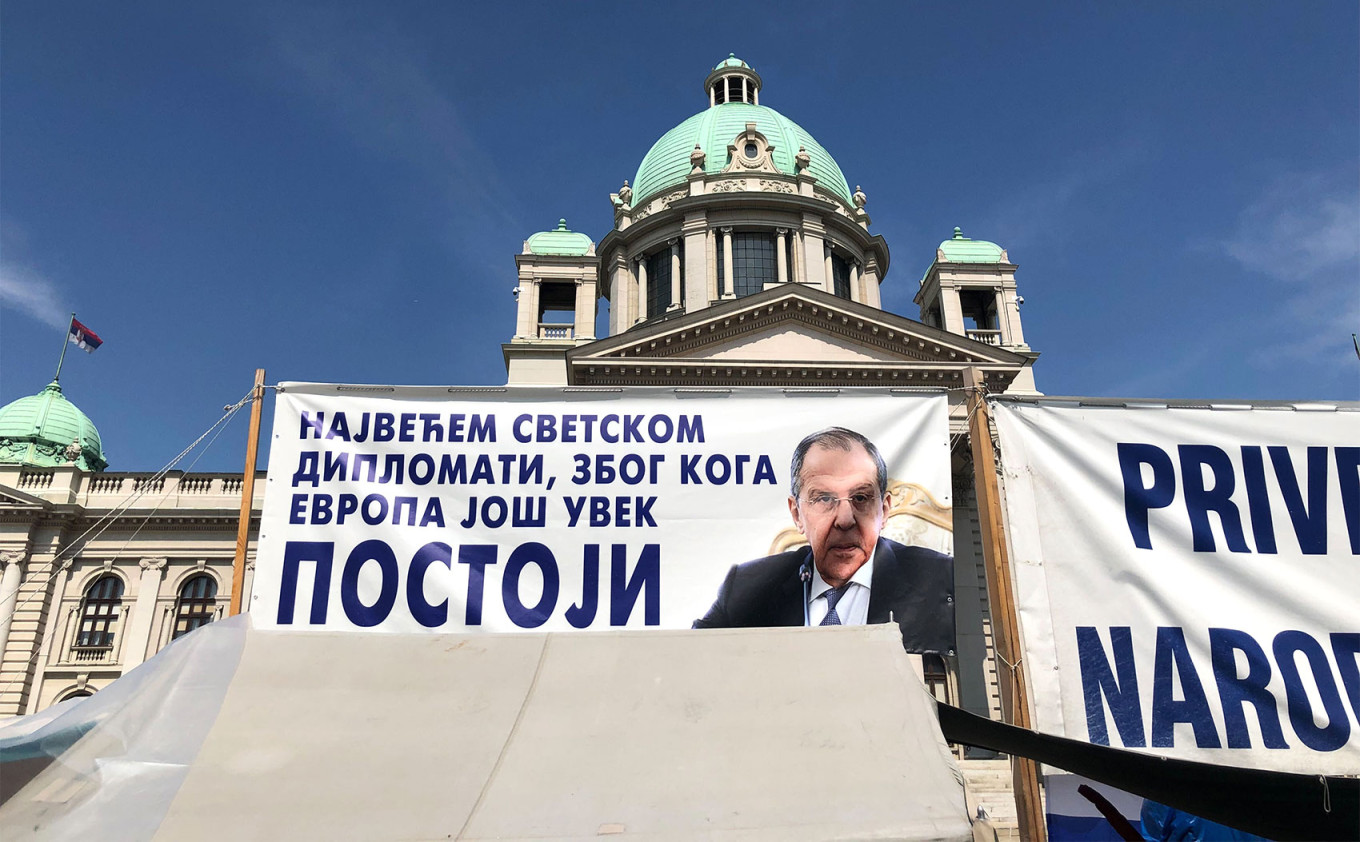
“My company just relocated everyone here, so I didn’t even think about it,” said Anton, a 24-year-old IT specialist from Moscow who moved to Belgrade in April.
“I didn’t expect Serbia to be such a cool country and for Serbs to be such nice people. It’s not just about them loving Russians as much as they do, they are just kind and open,” Anton, who declined to give his surname for safety reasons, told The Moscow Times.
Though no official data on Russian migration is available, up to 50,000 Russians have settled in the country since February, according to a report earlier this month by German media outlet Deutsche Welle.
Support for Russia remains high in Serbia six months into Moscow’s war.
A June opinion poll by the Demostat Research Center showed Russian President Vladimir Putin was Serbia’s most popular foreign politician and over 50% of Serbs believed Western military alliance NATO was responsible for the events in Ukraine.
One of the reasons Serbia is particularly attractive for relocating Russians is that the country hasn’t joined Western nations in imposing sanctions on the Kremlin over the war.
In a rare visit by a European official, Serbian Interior Minister Aleksandar Vulin met with Lavrov in Moscow last month. He highlighted to his Russian counterpart that Serbia was the only country in Europe not to impose sanctions and to have avoided “anti-Russian hysteria.”
By basing themselves in Serbia, Russian companies not only retain access to European markets and European firms — they can also easily return to Russia if needed.
Unlike other European countries that have closed their airspace to Russia, flights to Moscow still depart regularly from Belgrade’s airport.
“Basically, they are using Serbia for sanctions evasion,” Ivana Stradner, an adviser at the Washington-based Foundation for Defense of Democracies, told The Moscow Times.
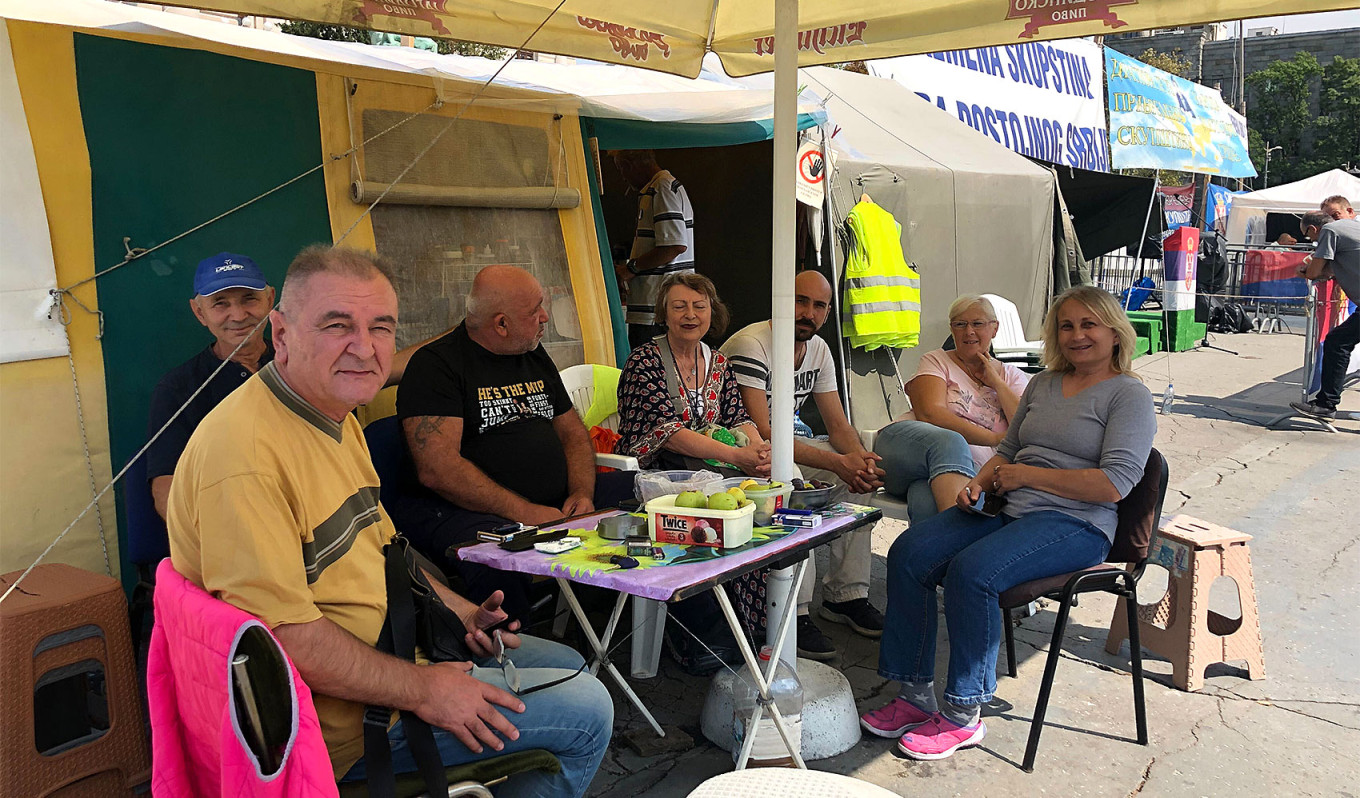
One of Serbia’s most high-profile Russian arrivals is IT giant Yandex, which opened a new office for 700 employees in Belgrade’s central Dorcol neighborhood earlier this summer.
“The office in Serbia… will support the continued development of a number of Yandex’s international services, including Taxi and Delivery, which are already operational in Serbia,” Yandex’s press service said in a response to questions from The Moscow Times.
The Dorcol neighborhood’s vibrant streets also house Russia’s state-run Sputnik news agency, which continues to operate in Belgrade despite being banned in the EU.
The Sputnik Belgrade bureau’s editor-in-chief Ljubinka Milinčić said last month that the outlet will soon be joined in the city by Russia’s state-run international broadcaster RT, which was forced to cease operations in the U.S. and the EU after the Russian invasion.
Neither Milinčić nor RT’s press office responded to questions from The Moscow Times about Sputnik’s and RT’s plans for expansion in Serbia.
While the arrival of RT is unlikely to significantly alter the media landscape in Serbia, its presence in the country would be symbolic, according to Engjellushe Morina, senior policy fellow at the European Council on Foreign Relations.
“I find it a bit strange that Serbia is allowing it, especially now when there is a lot of pressure on Serbia with regards to ‘choosing sides’ [between Russia and the EU],” said Morina.
Russia’s already sizable influence on the local media landscape became apparent last month amid tensions in the formerly Serbian province of Kosovo.
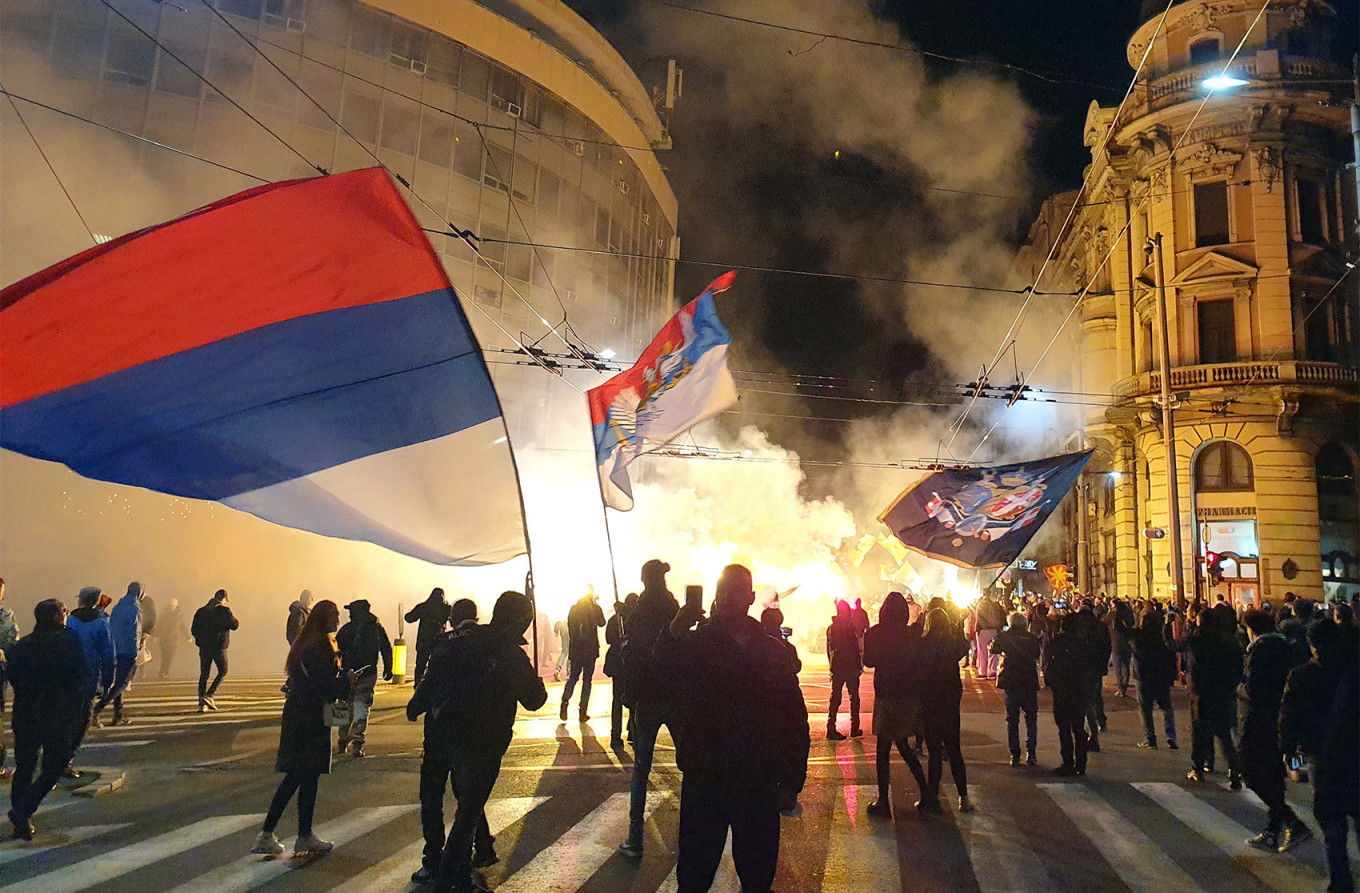
“The disinformation on social media went a bit wild,” Morina said of coverage of the incident that centered on a dispute about Kosovo’s license plate regulations. “There has been a lot coming from different sources related or somehow linked to Russian propaganda.”
In particular, much of the Russian-language coverage of the incident in Kosovo appeared to push the possibility of a “new Balkan war.”
“What is new is the way how Russia is amplifying this,” said the Foundation for Defense of Democracies’ Stradner. “They are gaslighting [the world] about a new war.”
Like other analysts, Stradner suggested the Kremlin will likely continue to try and use its footing in Serbia to foster instability and distract Western politicians from Ukraine.
“We need to pay attention to the information space because Russia is definitely setting informational conditions for further unrest,” said Stradner.
Back at the square in central Belgrade, there were no such fears.
When asked about Russia’s invasion of Ukraine, protester Pajić held forth about the positive effects of the war.
“This is a story of the liberation of all humanity,” he said.
A Message from The Moscow Times:
Dear readers,
We are facing unprecedented challenges. Russia's Prosecutor General's Office has designated The Moscow Times as an "undesirable" organization, criminalizing our work and putting our staff at risk of prosecution. This follows our earlier unjust labeling as a "foreign agent."
These actions are direct attempts to silence independent journalism in Russia. The authorities claim our work "discredits the decisions of the Russian leadership." We see things differently: we strive to provide accurate, unbiased reporting on Russia.
We, the journalists of The Moscow Times, refuse to be silenced. But to continue our work, we need your help.
Your support, no matter how small, makes a world of difference. If you can, please support us monthly starting from just $2. It's quick to set up, and every contribution makes a significant impact.
By supporting The Moscow Times, you're defending open, independent journalism in the face of repression. Thank you for standing with us.
Remind me later.



